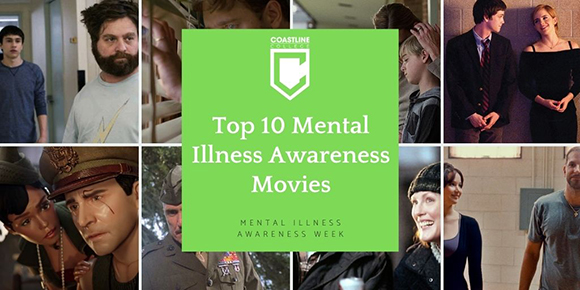Ranking some of the best films to show the reality and spread awareness of mental illness during Mental Illness Awareness Week.

I remember the first time I saw Ordinary People (1980). It was just a month or so after my grandfather died. I think what struck me then, and still strikes me to this day, about legendary actor Robert Redford’s directorial debut is how the film’s characters cope with their grief at the loss of a son and brother. Each of the Jarrett family grapples with loss in their own way, some better than others, but the film allows each the dignity of their own grief and suffering.
Hollywood has a complicated, fraught history with depicting mental illness on screen. Let’s be honest. Most movies and TV shows have done a poor job of it, often demonizing those with heartbreaking conditions; this still occurs in the entertainment industry, for example, Ryan Murphy’s absurd new Netflix show Ratched (an origin for Nurse Ratched of One Flew Over the Cuckoo’s Nest). On the other end, some films have downplayed the effects of mental illness, reducing conditions like anxiety and depression to mere talking points.
Explore Mental Health Services Available @ Coastline
It is rare to have a film meet an issue, any issue, but mental illness specifically here, on its own turf and render it accurately and appropriately. But there are exceptions, some of which have been listed below. Take some time this week to check these films out; they may help you comprehend your own mental illness or health struggles, but I cannot say that with certainty. However, I will promise one thing: they will entertain and enthrall you.

1. Matchstick Men (2003, dir. Ridley Scott) – This story of a con artist attempting to break his criminal habits also showcases an excellent portrayal of Obsessive Compulsive Disorder, and stars Nic Cage, so win-win.
2. The Perks of Being a Wallflower (2012, dir. Stephen Chbosky) – A sweet, good-natured film cut from similar cloth as all those John Green adaptations we know and love; starring Logan Lerman and Emma Watson (“it’s Levi-OH-sa”), the film handles its lead characters’ trials with depression with a light, but humanizing touch and is an excellent movie to watch with pals, or a significant other *nudge, nudge* if one is available.

3. Silver Linings Playbook (2012, dir. David O. Russell) – This dramatic film garnered eight Academy Award nominations, ultimately winning one for Jennifer Lawrence in her role as a troubled widow. Bradley Cooper stars as a recently released mental hospital patient suffering from anxiety and bipolar disorder trying to put his life back together.
4. A Beautiful Mind (2001, dir. Ron Howard) – This film about Nobel Prize-winning economist John Nash, played by Russell Crowe, and his life with schizophrenia won four Academy Awards, including for Best Director and Best Picture. Tell me: “are you not entertained” by this mega-hit? Seriously, are you not? (I know, wrong Crowe flick.)
Mental Health Awareness @ Coastline
5. The Great Santini (1979, dir. Lewis John Carlino) – Set during the early 1960s, before the United States entered the Vietnam Conflict, this film tells the story of a highly successful fighter pilot with immense faults as a husband and father. The film stars Robert Duvall as “the great Santini” himself in its exploration on the affect of narcissism on not just an individual, but a family.

6. No Letting Go (2015, dir. Jonathan D. Bucari) – An exquisite and under-known study of family dynamics and childhood mental illness, based on the true story of the film’s co-writer.
7. The Shipping News (2001, dir. Lasse Hallström) – An international co-production, starring the great Julianne Moore and not-so-great Kevin Spacey, this film delves into family secrets and depression as key topics.
8. Ordinary People (1980, dir. Robert Redford) – The film with which I started this post above; an extraordinarily well-acted study of a family’s collapse and attempts to deal with the loss of a son and brother, starring Donald Sutherland, Mary Tyler Moore, and Timothy Hutton, who was the youngest recipient of the Academy Award for Best Supporting Actor for his role as troubled teen Conrad Jarrett.

9. It’s Kind of a Funny Story (2010, dir. Anna Boden & Ryan Fleck) – A study of teenage anxiety and depression, this film is a heartfelt and entertaining entry in the well-trodden coming-of-age genre.
10. Welcome to Marwen (2018, dir. Robert Zemeckis) - From legendary director Robert Zemeckis, of Forrest Gump and Back to the Future fame, this film is an innovative mix of animation and live-action, and chronicles a man’s trials with Post-Traumatic Stress Disorder after being severely assaulted. The twist of this film is its light touch and the fact that the main character, played by comedy legend Steve Carell, builds a fictional village and action hero/figurine stand-in to help him through his trauma.
Final Thoughts
All of these films depict people in crisis of various kinds; but what stands out is the way these films present their characters as being so much larger, more alive than their illnesses. What also amazes me is the broad range of styles expressed by these films. Some separate the drama and comedy and others depict a true-to-life messiness between sunny and suffering. Most importantly, these are human stories. They belong in the realm alongside any tale of compassion and dignity, as all stories ultimately do.
It’s worth pointing out that all of these films were directed by men, except for It’s Kind of a Funny Story, which was co-directed by a woman, and by White men at that. For the most part, the films’ subjects are heteronormative, White, and often male, which simply doesn’t reflect the reality of both mental illness and, well, reality overall. We must actively strive to correct and remedy this situation, just as much as we should actively strive to correct and remedy the portrayal of mental illness on screen. At least these films can serve as stepping-stones, signposts if you will, for a more understanding, more compassionate Hollywood. They are step one, and the road ahead is long and twisty, but I believe with effort and elbow grease we’ll get there in the end.